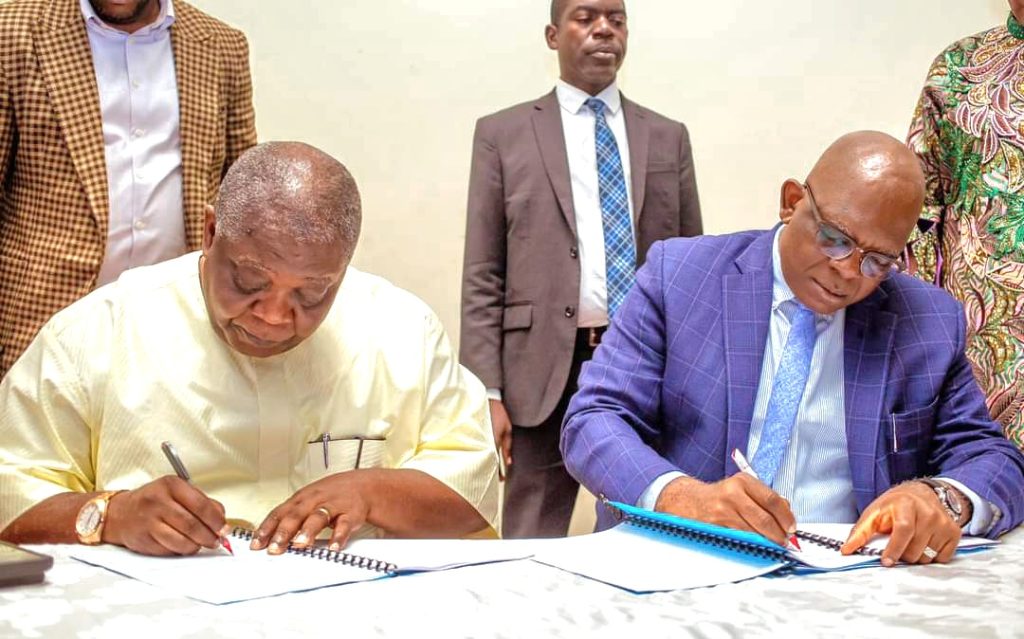
In a significant move to enhance the efficiency of cargo transportation across Nigeria, the Nigerian Shippers’ Council (NSC) and the Nigerian Railway Corporation (NRC) have signed a Memorandum of Understanding (MoU).
The agreement, which was formalized during a stakeholders’ summit in Lagos on Thursday aims to address the challenges hindering the effective rail transportation of goods from seaports to inland destinations.
Under the terms of the MoU, both agencies will work closely to ensure that the infrastructure and operational frameworks necessary for seamless cargo movement are in place. This partnership is expected to significantly reduce the congestion at seaports, minimize delays in vessel offloading, and cut down demurrage costs.
The Executive Secretary of the Nigerian Shippers’ Council (NSC), Barr. Pius Akutah in his keynote address, highlighted the critical need for enhanced intermodal connections, particularly between seaports and Inland Dry Ports (IDPs). He stressed that the collaboration between the NSC and NRC is geared toward achieving faster, more cost-effective cargo delivery, which is crucial for the growth of Nigeria’s economy.
Akutah pointed out that rail transportation, particularly for long distances and large volumes of goods, is not only efficient and economical but also environmentally friendly, reducing greenhouse gas emissions compared to road transport.
However, the NSC Executive Secretary acknowledged that the lack of a functional rail system for cargo evacuation has led to significant challenges, including congestion at seaports, delays in vessel turnaround times, and increased costs of doing business. He expressed hope that the summit would identify the challenges hindering the effective transportation of cargoes to the hinterland and propose actionable solutions.
“Rail transportation is not only efficient and economical but also a safer mode of transporting large volumes of goods over long distances. Our collaboration with the NRC is focused on unlocking these benefits by improving the connectivity between seaports and IDPs,” Akutah stated.
On his part, Managing Director of the NRC, Mr. Fidet Okhiria, echoed the importance of this collaboration, noting that the NRC is committed to fulfilling its part of the agreement.
Okhiria pointed out that one of the main challenges is the availability of sufficient cargo to move by rail. However, he acknowledged that for the MOU to be effectively implemented, there must be sufficient goods to transport.
The NRC Managing Director stressed the difficulty in gathering adequate cargo, stating that the NRC recently had to source 17 containers from across the country for a single shipment from Kano, which took considerable time and effort.
To address this issue, Okhiria called on the Manufacturing Association of Nigeria and other stakeholders to collaborate and ensure that goods are moved in bulk. He also stressed the importance of creating an enabling environment at the terminals to make rail transportation more accessible and cost-effective for importers and exporters.
“The charges at terminals for rail transportation have been a major hindrance, but with the Shippers’ Council now taking the lead, we are optimistic that these challenges will be addressed, making rail transport a more attractive option for businesses,” Okhiria added.
Speaking earlier, Director, Inland Transport and Services of the NSC; Mrs Ify Okolue noted that the objective of the summit is to identify the challenges facing the Nigerian Railway Corporation (NRC) infrastructural development.
She added that the NSC and the Federal Ministry of Marine and Blue Economy stand resolutely committed to creating an enabling environment for the actualisation of optimal and seamless movement of cargoes by rail from the seaports to the inland dry ports and the hinterland in general.
“The objective of the summit amongst others is to identify the challenges facing the Nigerian Railway Corporation (NRC) infrastructural development; the role of the Nigerian Custom Service towards enabling seamless movement of cargo/reduction of cost of doing business in the port, proffer practicable solutions to the identified problems and open up discussions on the possibility for Public Private Partnership (PPP) in the provision of rail transport services with a view to promoting multimodal approached to cargo evacuation and distribution to the hinterland” Okolue noted.















